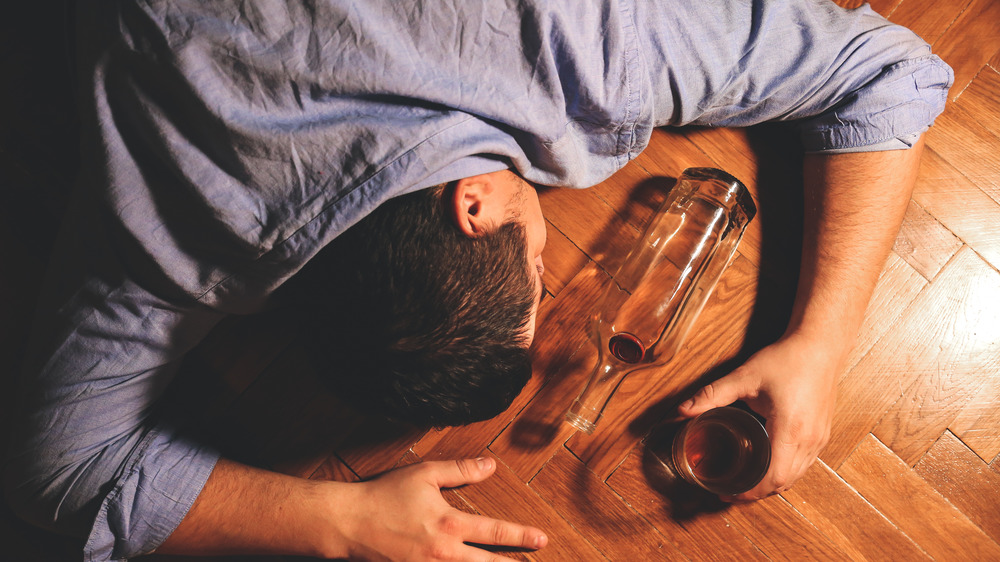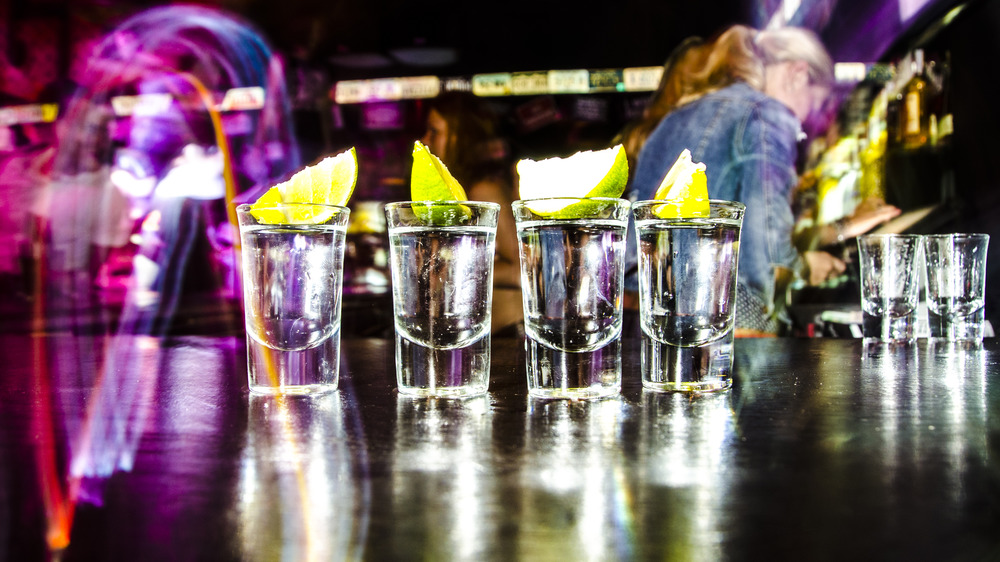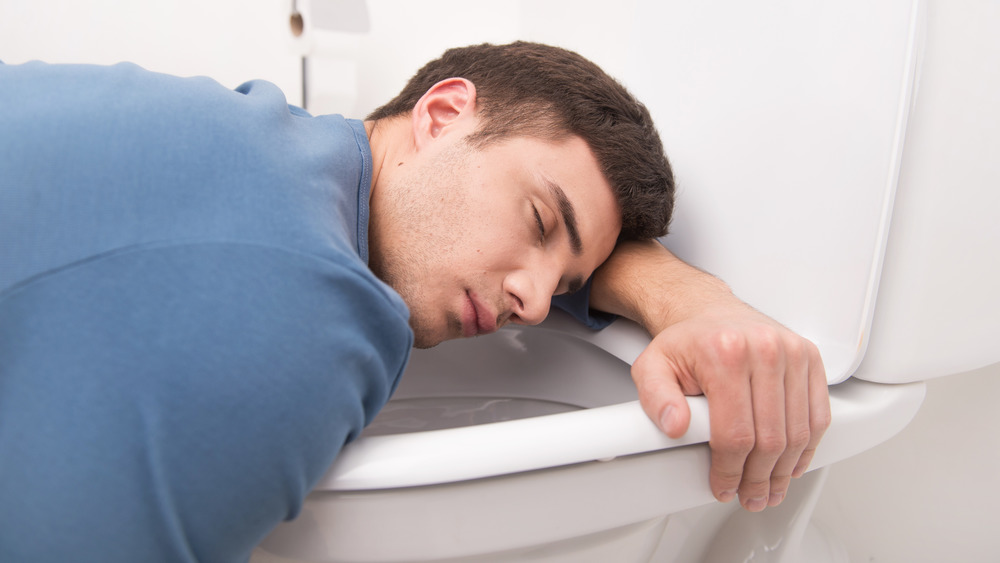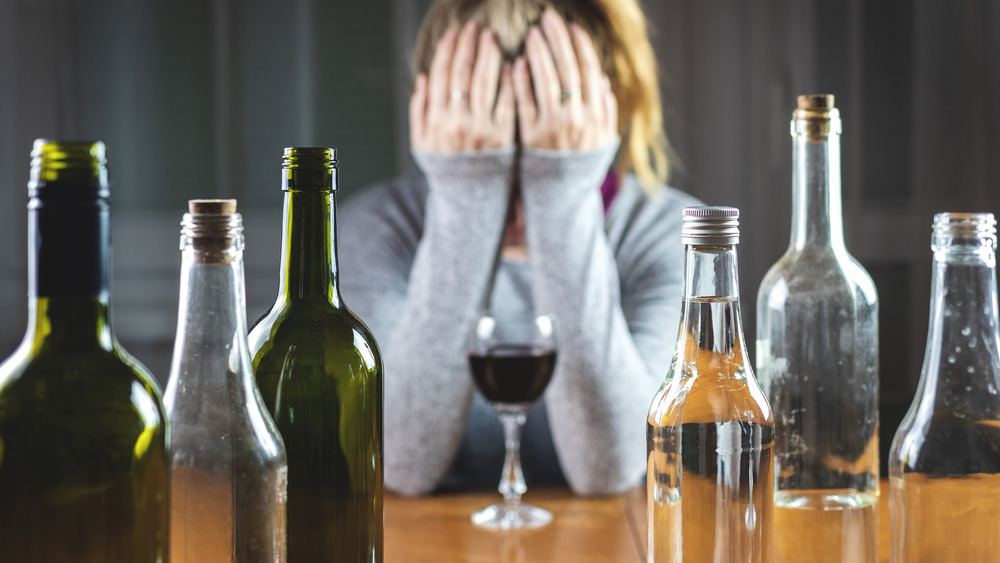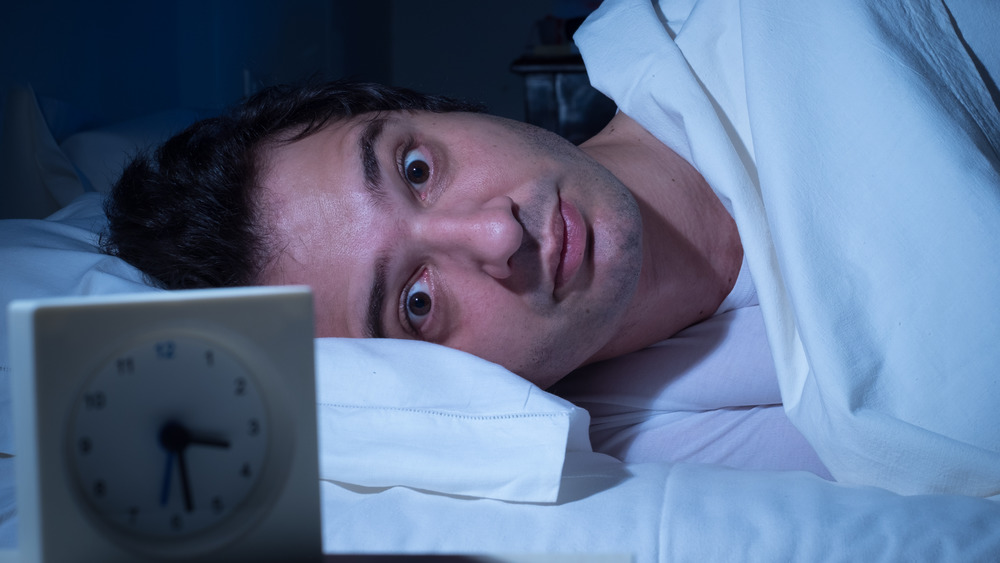You Might Be Drinking Too Much If This Happens To You
An estimated 95,000 people (68,000 men and 27,000 women) die from alcohol-related causes each year, according to the National Institutes on Alcohol Abuse and Alcoholism. These causes include liver disease, cardiovascular disease, and cancer, Harvard Health Letter reported. And that's not even addressing deaths from alcohol-related mishaps.
Heavy drinking can be defined by a number of drinks: More than one per day or eight per week for women and more than one or two per day or 15 per week for men. But even if you drink less, you could still have alcohol use disorder (AUD). "There's no specific amount of alcohol or frequency of drinking that determines the nature of AUD," Harvard Health Letter explained.
The good news is that if you're even willing to ask yourself whether you might be drinking too much, it's a healthy sign and potentially a step in the right direction, Dr. Lori Ryland, a licensed clinical psychologist and chief clinical officer at Pinnacle Treatment Center, told Health Digest. Here are some of the signs that might mean you've been drinking too much.
You're drinking too much if you frequently drink more than you had planned
Whether or not you've been drinking "too much" depends on what "too much" means in your individual circumstances. In other words, the bar for drinking too much will be lower for, say a pregnant woman than for a 21-year-old man. Additionally, any drinking while underage is considered excessive by the CDC.
But for those of legal drinking age, a subtle hint that you might be drinking too much is if you drink beyond your self-imposed limit, according to Dr. Brian Wind, psychologist and chief clinical officer of JourneyPure. Maybe you tell yourself you're only going to have one beer after work but that one bottle turns into several, or a margarita turns into four. Dr. Wind told Health Digest that setting a limit indicates you have some awareness of a potential issue, and yet you cannot exercise control over your behavior. It's important to consider the possibility that you might be drinking too much.
Frequently losing track of how much you've had to drink could mean you've lost control of your drinking
Consuming alcohol dampens your inhibitions, Dr. Brian Wind, psychologist and chief clinical officer of JourneyPure, told Health Digest. While there is nothing overtly wrong with recognizing that the relaxing of your inhibitions offers a pleasant "lubricant" to your social encounters, it may be a sign of a problem if one drink for the sake of attitude adjustment becomes another, and then another, until you've lost track of how many drinks you've had.
Moderate, non-problematic drinking is characterized by rational deliberation, according to Wind, which is to say, "control." For example, someone who does not have a drinking problem will make sure to stop drinking after a drink or two in order to be able to drive home safely hours later.
Conversely, one of the classic characteristics of addiction is a loss of control over your consumption of the substance in question. So if you're frequently waking up after an episode of drinking and wondering how your bar bill got so high or where all the bourbon you had stocked on your bar cart went, you might need to consider the possibility your drinking's become problematic.
Unexplained weight gain could be a sign of drinking too much
Overconsumption of alcohol can lead to overconsumption of food, Dr. Lori Ryland, a licensed clinical psychologist and chief clinical officer at Pinnacle Treatment Center, told Health Digest. In fact, drinking too much can directly lead to weight gain or exacerbate existing weight issues. Depending on what your "poison" is, alcohol can be highly caloric. A single fruity cocktail may contain more than 500 calories, not to mention added sugar, which only increases your cravings for more sugar.
When you've been drinking, you are also more likely to eat more food than you normally would want to, and you'll likely gravitate to unhealthy foods. The reason? Your inhibitions are lower, as Dr. Brian Wind, psychologist and chief clinical officer of JourneyPure, pointed out. If you find that you have been gaining weight and are scratching your head as to why, you might want to consider your drinking habits.
You might be drinking too much if you regularly find yourself binge drinking
Binge drinking is defined by the Centers for Disease Control and Prevention as a pattern of drinking that brings a person's blood alcohol concentration to 0.08 or higher. "This typically happens when men consume 5 or more drinks or women consume 4 or more drinks in about 2 hours," per the CDC.
Although most people who binge drink do not have a serious, chronic problem with alcohol, it isn't a reach to presume that they are likely drinking too much, particularly when the binge drinking is associated with dangerous behavior such as driving while intoxicated and engaging in unprotected sex with strangers.
Binge drinking can also be problematic when it is related to self-medicating through alcohol, according to Dr. Brian Wind, psychologist and chief clinical officer of JourneyPure. If you frequently find yourself the spending the better part of the day looking forward to drinking as a way of "taking the edge off," your drinking can be cause for concern.
If your drinking often leads to vomiting, it's a sure sign you're drinking too much
The need to vomit after drinking is not, in and of itself, a sign that you have a drinking problem, according to Dr. Saul F. Rigau, emergency department medical director at Scranton's Geisinger Community Medical Center, told Geisinger.org. People who are unaccustomed to drinking may find that alcohol irritates their stomach, particularly if there is little else in the stomach. In addition, vomiting is your body's natural and protective response to ingesting toxins, including alcohol.
However, if you typically consume alcohol in excess, especially to the point of vomiting, it is a sign that you're drinking too much. "Even if you only go out once a week — or even less! — but you find that you never seem to drink in moderation, that's a warning sign," according to Cornerstone of Recovery, an alcohol and drug rehab center.
You should also know that the more often you put yourself in the position of binge drinking, the more you risk of choking and asphyxiating on your vomit. As it happens, frequent vomiting can impair your body's gag reflex, which is there to prevent you from choking.
Denial isn't just a river in Egypt, it's a sign you might have a drinking problem
If you frequently find yourself in denial about how much you've been drinking, that may well be an indication that you are, in fact, drinking too much, Dr. Brian Wind, psychologist and chief clinical officer of JourneyPure, told Health Digest. Sure, it may sound like a cliché, but as they say, clichés become clichés for a reason — and this one is no different.
Denial is a powerful defense mechanism that is fundamental to almost any sort of addiction. It may consist of lying to others, or it may involve lying to yourself. And by "lying," we mean not only verbally, but behaviorally. For example, if you feel you've been drinking too much, you may find yourself tossing your empty bottles at a dumpsite rather than in your own recycling bin, or otherwise hiding physical evidence of how much and how often you've been drinking.
Your denial enables you, albeit temporarily, to continue doing exactly what you've been doing. But as Vertava Health explained, "Denial doesn't offer protection from fallout. Those who are drinking at an alcoholic level are still doing tremendous damage to their brains and bodies — and putting others in harms way."
If you're withdrawing from concerned friends and family to continue drinking, you're likely drinking too much
Self-imposed isolation has long been associated with alcoholism. A person who drinks excessively and engages in denial may at some point come to understand that their denials are no longer effective — at least when it comes to convincing the people close to them that everything is "under control." In that case, the drinker may become what the American Addiction Centers refers to as "reclusive," meaning they push away friends and family, and particularly those who seem to be onto the fact that there's a problem.
Isolation, in such cases, can seem necessary for the drinker to maintain an unhealthy yet highly addictive relationship with alcohol. In some cases, a high-functioning problem drinker will continue to work and live among their family members but withdraw emotionally. If you've been drinking too much — to the point where your relationship with alcohol has come to be more important than your relationships with friends and family — it is critical that you seek help. Likewise, if you suspect someone you love is struggling with alcohol abuse disorder, reach out.
You might be drinking too much if you frequently experience lapses in memory related to drinking
After imbibing enough alcohol, you may experience gaps in memory from while you were intoxicated, according to the National Institutes of Health. The question of "how much" you've consumed is not relevant. All that matters is that you have drank enough to have experienced what is known as a "blackout."
There's a neurological process at work here, which is that alcohol is capable of temporarily blocking what is known as the "consolidation" of memories form short-term to long-term storage in the brain's hippocampus. When you black out, you might pass out. Or you might continue to go about your business, without anyone, including yourself, being aware that you've drank so much that it has adversely affected your brain function.
Blacking out can be difficult to identify, at least initially, but if you're finding more and more that friends and family members are reminding you of things you said or did while drinking — of which you have no recollection — then you need to consider the possibility you've crossed the line into drinking too much.
Shame can be the result (and cause) of drinking too much
"A common sign that your drinking has reached an unhealthy level is feeling ashamed about your drinking or what you might have done or said while you were intoxicated," Dr. Abe Malkin, a specialist in addiction medicine, told Health Digest. And this is a particularly worrisome sign because shame is profoundly destructive, according to June Tangney of George Mason University, who has been researching shame for decades, rarely leading to changes in behavior (via Scientific American).
In fact, feelings of shame may actually inspire you to give up hope of changing your shame-inducing behavior. And feelings of shame are strongly linked with depression, which can both lead to and exacerbate drinking problems. If you've been feeling ashamed of how much you drink or what you might have done while drinking, you have definitely been drinking too much, according to Dr. Brian Wind, psychologist and chief clinical officer of JourneyPure.
If your social calendar revolves around drinking, you may be drinking too much
If your social activities always revolve around drinking, Dr. Lori Ryland, a licensed clinical psychologist and chief clinical officer at Pinnacle Treatment Centers, said that's a good indicator that you're drinking too much. You might notice, for example, that you're turning down plans if you find out they will not involve alcohol, or you might not join friends or family at a restaurant just because that particular restaurant does not serve alcohol.
While there's nothing inherently problematic about enjoying a glass of wine or a cocktail with dinner, if drinking is a nonnegotiable condition for you to make an appearance, you might want to consider the possibility that your drinking has gotten out of hand, Dr. Ryland told Health Digest.
In addition, it's worrisome if you are choosing to surround yourself only with people who tend to enable your drinking. This is related to the notion of the reclusive drinker, but instead of cutting yourself off from people, you're filling your life with people who help you get your drinking done and who help you to justify it.
You're drinking too much if your drinking leads to dangerous, regrettable behavior
Perhaps after a night of drinking, you've called or texted someone whom you never would have contacted while sober. Perhaps a few glasses of wine inspired you to reveal a secret about yourself that you later wish you had not revealed. Or worse: Maybe after a night of hitting the bottle, you got behind the wheel of your car or failed to stop a friend from doing so.
"Many of us have tales of doing stupid things when we drink," according to Alcohol.org. This is because drinking alcohol temporarily alters the brain chemistry in very significant ways, which in turn impacts moods, thoughts, memory, physical movements, and bodily functions. However, if you find that you are getting yourself into illegal situations or frequently getting into harmful or potentially harmful circumstances while drinking, that is an indication that you might have a problem, according to WebMD.
Are you finding you have to drink more to feel the effects? You're probably drinking too much
If you're noticing it takes larger quantities of alcohol for you to feel intoxicated, this is a very worrisome sign, according to Dr. Abe Malkin, a specialist in addiction medicine. This phenomenon, known as "increased tolerance" to alcohol, indicates that your body has begun to accommodate itself to the alcohol you've been giving it — and that's not a good thing. What it means is that your liver has been forced to work overtime to metabolize increasingly larger amounts of alcohol. In other words, your liver is forced to respond to the onslaught of increasingly high levels of toxins.
It's important to note that just because your liver may be capable of accommodating increased alcohol use, it does not mean that your liver is not being damaged. And increased alcohol use can damage more of your body than just your liver. Plus, by developing an increased tolerance for alcohol, you are setting yourself up to consume more and more alcohol over time, which can have serious negative consequences on your health.
Hangover symptoms can point to a drinking problem
Drinking too much, even on a single occasion, is associated with a number of negative health consequences, according to the National Institute on Alcohol Abuse and Alcoholism. A night of drinking may lead to a hangover — a group of uncomfortable symptoms like headache and nausea — the next morning. The more you drink, the more likely you are to have a hangover the following day, according to the Mayo Clinic. A single hangover is not worrisome in and of itself. However, it might be worth using it as a learning opportunity with regard to all of the ways that alcohol affects our body.
However, if you're feeling hangover symptoms even when you have not been drinking, this should be considered a worrisome sign that you may have become physically dependent on alcohol, Dr. Abe Malkin, a specialist in addiction medicine, told Health Digest. This is especially true if your hangover symptoms are accompanied by mood changes, elevated heart rate, and blood pressure changes.
Getting sick frequently could be a sign that you're drinking too much
Drinking affects your body, and not just by making you feel uninhibited in the moment and hungover when you wake up the next day. Drinking has been associated with a higher risk of many serious illnesses, including cancers of the liver and pancreas. Drinking too much can also weaken your immune system.
According to the National Institute on Alcohol Abuse and Alcoholism, a single night of drinking can impair your ability to ward off infections for as much as 24 hours after you stop drinking. In addition, chronic drinkers are more at risk for a number of serious illnesses, including tuberculosis and pneumonia.
Adding insult to injury, alcohol can interfere with sleep, physician Richard Beyerlein told Health Digest. Although it has a sedating effect, your sleep while under the influence of alcohol is likely to be of poorer quality. Indeed, alcohol has been associated with an imbalance between slow-wave sleep and REM sleep, with the result being shorter sleep duration and more sleep disruption. A lack of sleep can also negatively affect the immune system, per the Mayo Clinic.


